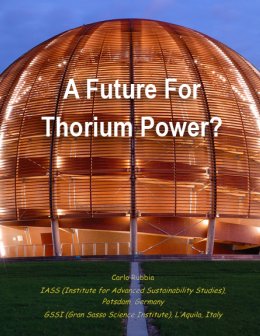Library
 |
Thorium Energy Conference 2013 - A Future for Thorium Power? PresentationCarlo Rubbia 2013 • The recent Fukujima accident, after the previous warning signs of Three Miles Island accident, has brought to sudden rest one of the most advanced and heavily Nuclear Energy exploited countries, creating a strong movement against a continuation of the Nuclear Power. • This has proven the inadequacy of the present “probabilistic” concept vastly used by the Nuclear Community and the necessity of an entirely new, alternative, “deterministic” approach. In order to be vigorously... |
 |
Towards sustainable, secure and safe energy future: Leveraging opportunities with Thorium PresentationAnil Kakodkar 2013 Growing economic empowerment of a larger part of world population and little carbon space available necessitates a quick shift to non-fossil energy sources. What we should do? |
 |
ThEC13 - Thorium Energy R&D in China PresentationHongJie XU 2013 HongJie XU from SINAP, China talks at Thorium Energy Conference 2013 (ThEC13) * CERN Globe of Science and Innovation, Geneva, Switzerland. |
 |
ThEC13 - The Japanese Thorium Programme PresentationSasa Toshinobu 2013 Sasa Toshinobu's presentation about the Japanese Thorium Programme at the Thorium Energy Conference 2013 (ThEC13) at CERN Globe of Science and Innovation, Geneva, Switzerland. |
 |
Thorium Deposits of the United States - Energy Resources for the Future?U.S. Department of the Interior 2009 Thorium minerals occur in alkaline igneous rocks and car- bonatites, but the most concentrated deposits occur in epigen- etic veins that surround alkaline igneous complexes. Thorium’s genetic association with alkaline igneous rocks also places thorium in close association with minerals that host other valu- able elements, such as those containing rare earth elements (REE), titanium, niobium, and phosphorus. Large titanium deposits can exist in the ultramafic units of the alkaline igneous... |
 |
Sub-critical thorium reactorsCarlo Rubbia 2009 Presentation slides by Carlo Rubbia on sub-critical thorium reactors |
 |
Thorium as energy source - Opportunities for NorwayThorium Report Committee, Research Council of Norway 2008 The Norwegian Ministry of Petroleum and Energy decided that an investigation into the possibility of utilizing thorium as a source of energy should be carried out. The Research Council of Norway (RCN) was given the responsibility to organize this study and the Thorium Report Committee was established in March 2007. |
 |
Thorium fuel cycle - Potential benefits and challengesInternational Atomic Energy Agency 2005 Thorium is three times more abundant in nature compared to uranium and occurs mainly as ‘fertile’ 232Th isotope. From the inception of nuclear power programme, the immense potential of 232Th for breeding human-made ‘fissile’ isotope 233U efficiently in a thermal neutron reactor has been recognized. Several experimental and prototype power reactors were successfully operated during the mid 1950s to the mid 1970s using (Th, U)O2 and (Th, U)C2 fuels in high temperature gas cooled reactors (HTGR... |
 |
An evaluation of the molten salt breeder reactorU.S. Atomic Energy Commission 1972 The Division of Reactor Development and Technology, USAEC, was assigned the responsibility of assessing the status of the technology of the Molten Salt Breeder Reactor (MSBR) as part of the Federal Council of Science and Technology Research and Development Goals Study. In conducting this review, the attractive feature and problem areas associated with the concept have been examined; but more importantly the assessment has been directed to provide a view of the technology and engineering... |
 |
The Use of Thorium in Nuclear Power ReactorsU.S. Atomic Energy Commission 1969 This report on "The Use of Thorium in Nuclear Power Reactors" was prepared under the direction of the Division of Reactor Development and Technology, U.S.A.E.C., as part of an overall assessment of the Civilian Nuclear Power Program initiated in response to a request in 1966 by the Joint Committee on Atomic Energy. It represents the result of the inquiry by the Thorium Systems Task Force whose membership included representatives of Babock & Wilcox Company, Gulf General Atomic Company,... |
